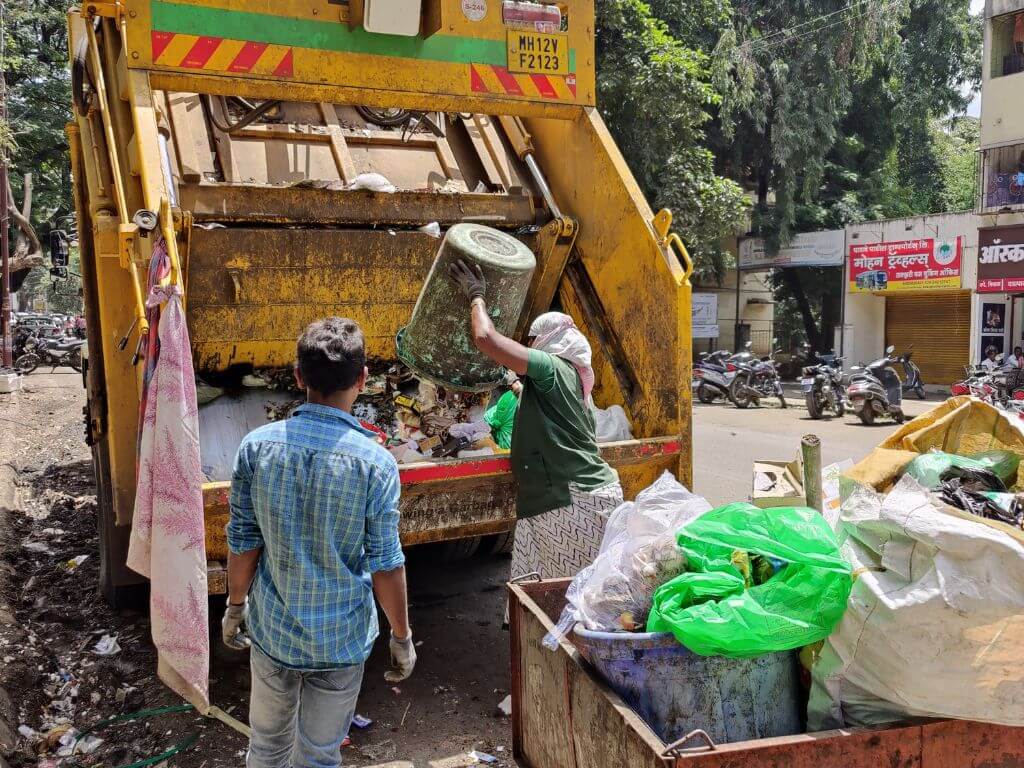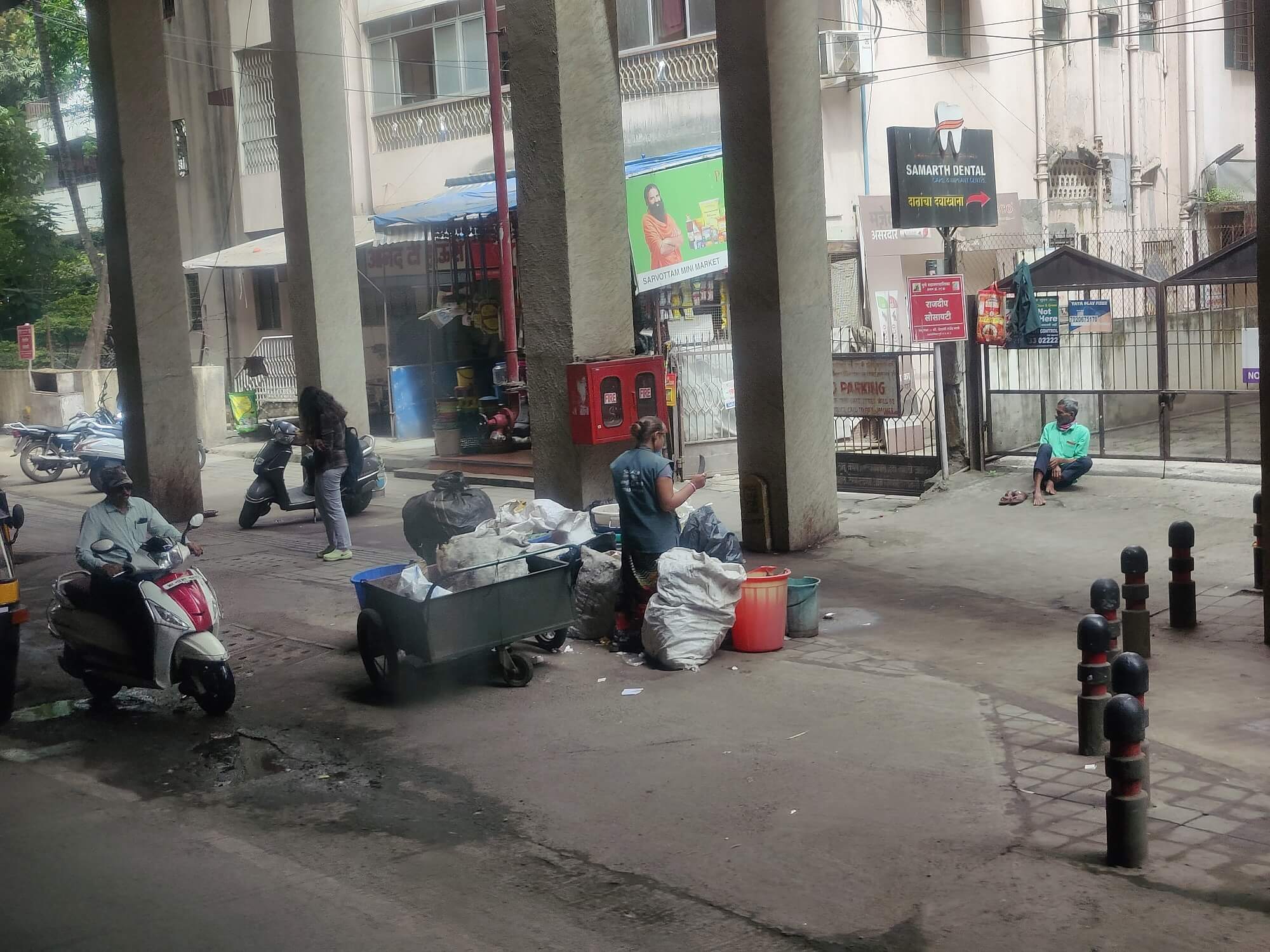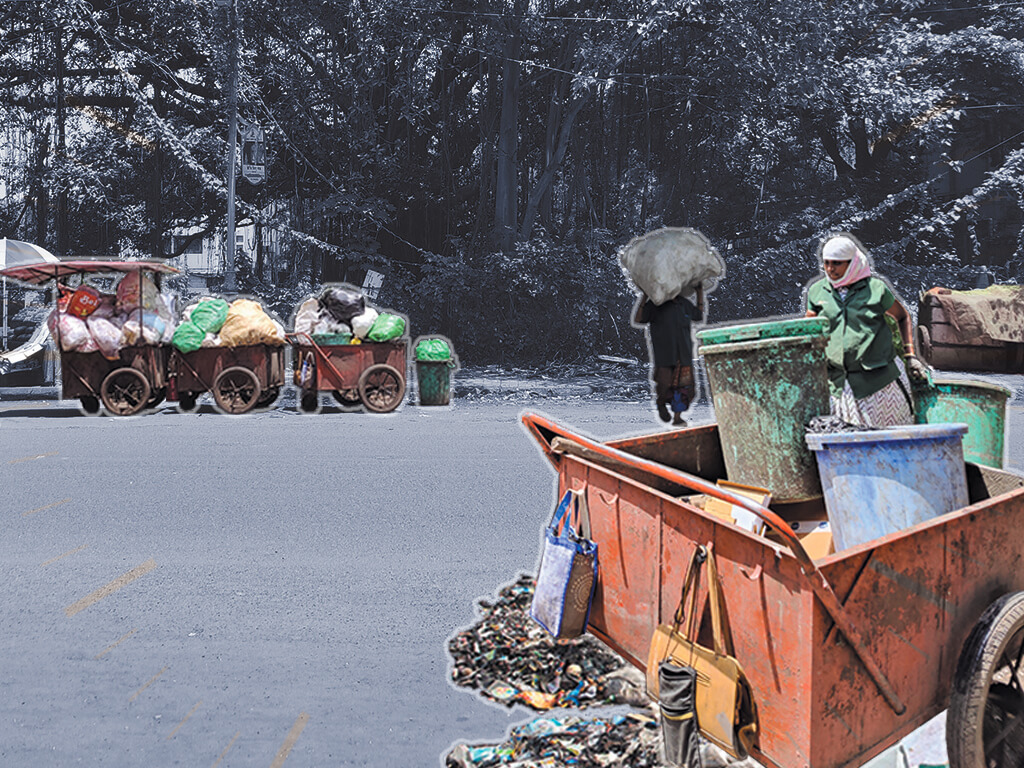Taware Colony in Pune’s Parvati Paytha could be any middle or upper-middle class locality in an Indian city – except that it is not. Here, around noon everyday, women gather in a shaded section for the ghanta gaadi (literally vehicles with bells, but garbage truck) to bring collected waste from the city’s feeder points on its way to the processing plant in areas like Ram Tekdi, Hadapsar, and Talegaon.[1] The women separate the waste into wet and dry, if it’s not already done, and then get down to the hardest part of their daily job – taking apart the items. They deftly pull a ballpoint pen into its elements such as plastic casing, ink refill, rubber grip and metal spring; a photo frame into wood, glass and cardboard; a notepad into paper, cardboard and plastic spring.
Before this, the women have gone door to door in different areas to collect waste on hand carts that now lie on the side of the road. The separated biodegradable waste is turned into compost while toxic and hazardous waste like sanitary pads and diapers is marked with red dots for further processing. For as little as Rs 80 per household per month, these waste picker women help keep areas of Pune clean; their labour is crucial to the sorting and recycling process which helps reduce the amount of garbage in overflowing landfills and nudges forward the recycling and compost-making processes.
“Aamhi paati var potha ghetla aahe(we carry garbage on our backs),” said Vidya Naik Navre, 35, one of the women at Taware Colony. She is a member of SWaCH, a cooperative under the umbrella of the waste pickers’ union called Kagad Kach Patra Kashtakari Panchayat (KKPKP) and the Pune Municipal Corporation (PMC) in 2007 when the city still had garbage containers on streets. She and her sister-in-law Reshma Naik Navre, 38, hailing from Akluj district in Solapur, started sorting waste from the containers with bare hands to find recyclables which they would sell for a living. The women and their husbands, like other waste pickers then, would “pick, sell, earn and eat” what they could.

Photo: Shivani Dave
SWaCH made a difference to both the city and the women waste pickers in the past 15-16 years – it altered waste management in a fast-expanding city towards a more climate-friendly system, made women waste pickers an integral part of it, and created a cooperative of women waste workers. Reducing garbage in landfills and recycling as much as possible are among the basic Climate Change mitigation practices at the city level. Solid waste, if left untreated, releases greenhouse gases like methane which have 21 times the warming potential of carbon dioxide. [2]
However, sorting waste and recycling have typically been undesirable informal work in most cities.[3] Pune shows it can be different.
There have been efforts lately to privatise the cooperative model. “Women want to work because they have created it on their own. If private contractors take this up, they will focus on making money by employing less labour, older women will be out of jobs and these contractors might employ only men,” Mangal Pagare, executive director of SWaCH, said. [4]
Women as change agents
Waste pickers, though critical to mitigation measures, are the least recognised cogs in urban waste management. The cooperative has helped in not only recognising but also streamlining their part into the waste management process. Like the Naik Navre women, Pune has nearly 14,000 women at this work, dignified in their uniforms and conscious that their work is important. Nearly 4,000 of them are members of the SWaCH cooperative while 10,000 are part of the waste pickers’ union.

Illustration: Shivani Dave
Pune produces nearly 2,200 tonnes of waste everyday, of which approximately 400 tonnes is plastic, according to Pune Municipal Corporation’s Solid Waste Department[5] Waste pickers segregate it at source when they collect and manage to divert about 200 tonnes of dry waste to recycling plants everyday which would have otherwise ended up in landfills.[6]
“The women waste pickers make up 80 percent of SWaCH’s workforce. The waste goes to the landfill only after recyclables and reusables are carefully separated by the waste pickers,” said Pagare. The recyclable items are sold at any of the four shops owned by members of the union. The women waste pickers of Pune are playing a crucial role towards making the city zero-waste which, according to the United Nations Environment Programme (UNEP), is “shorthand for efforts to reduce, reuse, redesign and recycle, to throw away less by making better use of what humanity produces and to design products that don’t end up as waste, especially after just a single use.” [7]

Photo: Shivani Dave
Waste picking central to zero-waste
The International Solid Waste Association estimates that the waste sector could cut 10 to 15 percent of the greenhouse gas emissions globally with the right waste management actions including disposal, recycling, composting and treatment. Reduction of waste generation, of course, is key to the outcome.
SWaCH set up a V-collect outlet in the Aundh area for Punekars to donate their pre-loved items for people to pick up what they liked. The pop-up centre has clothes, books, footwear, pots and pans for reuse and saving them from going into landfills.[8] Reuse, as is widely acknowledged, reduces the demand for new goods and therefore their production during which materials and processes generate emissions. Zero-waste cities and circular economies thus protect natural areas, help clean the air and water to make cities more ‘efficient, prosperous and competitive’.[9] The women waste pickers of Pune do their bit – and more.
Nearly one million households in various areas of Pune are visited for picking up waste and sorting it every day by the women of SWaCH. Their efforts add to nearly 80,000 tonnes of waste recycled annually saving the municipal corporation at least Rs 100 crore, according to the information available. Besides waste pickers at the front end of the waste management process, the cooperative has women in other job functions such as managing feeder points of waste collection, running the recycling shops and so on at the back end. Women like the Naik Navare sisters-in-law are waste pickers, the rest are waste workers.
Once waste is collected and segregated, the sorted materials such as plastic, rubbers, tin and more have to be stored until they reach a certain weight. Kadkadi (plastic bottles), puttha (cardboard), pandhra (white paper), phuga (bulb), kada (bangles) all fetch different prices at the recycling plants which usually pay per kilo of material. In the absence of allotted storage space by the municipal corporation, the women are forced to find nooks and crannies across the city. “Like you have an office to go to, women waste pickers should have a shed to sort and store their stuff. They keep it in black bags around the city. Residents don’t care once the waste leaves their doorsteps but the women have to collect it over a few weeks to reach the desired quantity. Where will they store it, in their homes?” asks Pagare.
The municipal corporation provides a rebate of five percent on property tax to societies, institutes and commercial establishments who compost on site.[10]

Photo: Jashvitha Dhagey
Nuts and bolts of waste picking
SWaCH provides the women pickers with a hand cart, buckets, a scarf, a pair of gloves and footwear. Some of these are replaced regularly, others need replacement such as the buckets and carts that the Naik Navre women use. It also provides training on waste segregation, soft skills to speak to residents, information about locations of feeder points, operating biogas plants, and organic waste converters. “People didn’t respect us before but they ask for our names to get to know us now,” said Reshma Naik Navre.
Their work conditions are still not ideal but this is a big deal for the women given that they used to scour waste with bare hands and take home barely Rs 20 per household per month. They now earn an average of Rs 16,000 a month. Besides, the union supports their children with scholarships for study so that the generational nature of this occupation may be broken.[11] The children of both the Naik Navre women are studying in engineering colleges.
Though this is an improvement over their earlier lives, waste pickers do not have other benefits or pension. The work takes a toll on their health given the physical labour required every day and the constant contact with hazardous materials in the waste. “Our skin burns, bodies ache,” said a waste picker who did not want to identify herself. The women are still awaiting proper sanitation facilities at or near feeder points, given that they need wash areas after handling the trash.
Over the years, the union has carried out education and advocacy programmes to not only inform members of their rights but also educate them about Climate Change. The waste pickers and others are aware of the hazards of Climate Change and extreme weather events – unhalyat paus (rain in summer) – and their role in waste management. They know, as some of the women told us, that their work contributes towards drains remaining unclogged and keeps the soil and air less contaminated. “Aamhi paryavarnacha rakshak aahot (we are protectors of the natural environment),” they said.
The model of waste collection and segregation is funded by residents of areas where SWaCH cooperative’s women work; residents directly pay waste pickers[12] It is more challenging than it looks on paper and a few residents still show their prejudice against the women. “Some societies still don’t see merit in giving their waste to the women. They feed street dogs but choose not to pay the women doing honest work to pick up their waste,” said Pagare.

Photo: Shivani Dave
The way to zero-waste city
The importance of collecting and segregating waste continues to rise given that waste not managed properly has the potential to bring cities to a halt when climate disasters strike.[13] A study on the global impacts of flooding found that bottles, nylon threads, plastic bags and sachets were the most commonly observed plastic items blocking drainage systems.[14] This helps contextualise the importance of waste pickers.
However, as a 2020 report titled The state of informal workers in India pointed out, the Indian Penal Code considers waste pickers as committing theft. “As waste is considered the property of a municipality, its handling and collection by waste workers who are not recognised in the system puts them at risk for prosecution, adding to their plight,” it stated[15] Green initiatives speak about banning plastics and replacing with paper and bamboo but Pagare said this adversely impacts waste pickers.
Can other cities adopt the Pune model? Of course, but not unless waste picking jobs are formalised, according to Pagare. The SWaCH cooperative and union framework could be the blueprint for climate-informed waste management. Municipal corporations or municipalities would benefit financially too as Pune’s did. [16] Currently, “waste pickers save the PMC Rs 15 crore per annum in waste handling costs alone,” according to its data[17]
People in cities recoil – rightly so – from the garbage piled up at street corners and random places but often fail to see the waste management process in its entirety including the crucial role of these women waste pickers. Effective urban waste management – one of the important mitigation measures of Climate Change hazards – is central to the mission of zero-waste cities and this relies on the existence and efficiency of waste workers.
With waste generation expected to triple in quantity over the next 30 years, [18] the role of waste workers – especially waste pickers, mostly women – becomes significant. As climate soldiers contributing to mitigation efforts, they break the mould of women as mere victims of Climate Change.
(Apsara Aga contributed to the reporting of this essay)
Jashvitha Dhagey is a multimedia journalist and researcher. She developed a deep interest in the way cities function, watching Mumbai at work. She holds a post-graduate diploma in Social Communications Media from Sophia Polytechnic. She loves to watch and chronicle the multiple interactions between people, between people and power, and society and media.
Shivani Dave is an architect, writer and illustrator interested in exploring the intersection of architecture and social sciences. After graduating in architecture from Mumbai, and in media from the London School of Journalism, she is applying the fundamentals of architectural research and writing within urban contexts to develop phenomenological ideas about life in cities.
Cover photo: Shivani Dave




